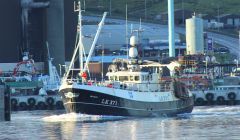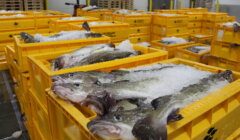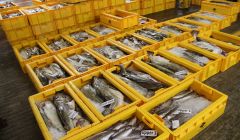Letters / History lesson
During the lead up to Brexit, many in the UK media made a big issue of how unimportant the present fishing industry was to the UK economy.
But no one appears to have looked back through history, to see how important the fishing industry was to the UK economy in the fifties and sixties.
Great Britain at that time had tragically lost so many lives during two world wars and had borrowed massively to help our allies in the conflicts to free Europe and the world, by defeating the German, Italian and Japanese dictatorships, that were devastating the world in the second war only a few years earlier.
The people were hungry after years of food rationing, and what was left of the fishing industry went to sea and along with a prolific UK farming industry, they helped to put food back on the tables.
New fishing vessels were built in shipyards all around the country in a thriving UK shipbuilding industry, providing much needed jobs and income, shore-based fish processing followed the fishing fleets, who were fishing the shoals of herring and whitefish around the UK coastline.
The distant water fleets from Aberdeen, Fleetwood, Hull and Grimsby created wealth in those coastal fishing communities and surrounding areas until the fleets were denied access to the distant waters fishing grounds due to nations extending their fishery limits to 200 miles.
UK factories were back in production providing much needed jobs and earnings. British ports and docks were booming, with a thriving merchant fleet importing goods and shipping British produce worldwide, from an industrious UK manufacturing industry. Life was so good for so many.
Then we joined the European Economic Community.
Edward Heath surrendered our fishing grounds to the EEC, giving them equal access to the UK sovereign territory of the seabed and its resources around our shores.
Become a member of Shetland News
New EU fishing vessels were built with the aid of EU finance, which enabled them to build up a fishing performance, that acquired the rights to ICES fishing quotas in UK waters, while the UK fishing fleet was deemed by the EU to be too large and had to be reduced to preserve the fish stocks.
European fishing fleets grew and EU communities thrived, while UK shipbuilding, fishing and fish processing in coastal communities went into recession.
EU finance helped to move UK manufacturing businesses into EU countries, apparently more needful of employment.
Trading worldwide was replaced by trading with Europe, according to European rules and regulations.
The resulting demise of the UK fishing and manufacturing industries are now devastating facts of history.
And all of this happened during the tenure of various UK governments, thus highlighting a significant weakness in Westminster, in conducting negotiations with the EU.
A once Great Britain was great no more.
Now after the Brexit negotiations, it appears that the weakness in Westminster, that has plagued the UK relationship with the EU over more than half a century, is still prevalent in the halls of power.
The national resource of our nation’s fishing waters, in some places out to 200 miles and the fish quotas within that we thought would be reclaimed by supporting the Conservative party through the Brexit process are still being fished by our friends from Europe.
The fish quotas we were told would be returned to us, are only a fraction of what we were led to believe, and now it appears that our friends in the EU,are creating difficulties for exporters of fresh fish from UK fish processors.
If this continues unabated, this may finish off much of what is left of our fishing and fish processing industries, which would benefit our friends in Europe even more.
As time goes by, it looks like some people in high office are still trying to convince us, that our country can only survive if we surrender to, and put all our trust in, and be ruled by, an unelected dictatorship in Europe called the EU.
William Polson
Whalsay
Become a member of Shetland News
Shetland News is asking its many readers to consider paying for membership to get additional features and services: -
- Remove non-local ads;
- Bookmark posts to read later;
- Exclusive curated weekly newsletter;
- Hide membership messages;
- Comments open for discussion.
If you appreciate what we do and feel strongly about impartial local journalism, then please become a member of Shetland News by either making a single payment, or setting up a monthly, quarterly or yearly subscription.











































































